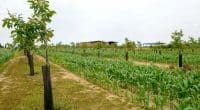The President of the Federal Republic of Nigeria, Ahmed Bola Tinubu, has just ordered the suspension of the 10% excise duty on single-use plastics in the country. His aim is to put an end to the negative effects of this tax adjustment on businesses and, to some extent, on households.
The 10% green tax on single-use plastics will not last long in Nigeria. Introduced at the beginning of May 2023 by the former Nigerian president, Muhammadu Buhari, it has just been suspended by the new president of the Federal Republic, Ahmed Bola Tinubu, as part of his bold reform programme.
While Muhammadu Buhari thought that this excise duty (indirect tax on the sale or use of a product, editor’s note) on single-use plastics would help to dissuade producers and consumers, and thus reduce plastic pollution in the West African country, Ahmed Bola Tinubu has other ideas. The new Nigerian president, installed on 29 May 2023, sees it above all as a tax policy that is unfavourable to businesses and households. “The aim of the new ordinance is therefore to mitigate the negative effects of this tax adjustment on businesses and the stifling of households”, Nigerian government spokesman Dele Alake explained to the press. The 10% excise duty also applied to containers, films and plastic bags.
Read Also – NIGERIA: Abuja to join WEF Global Partnership for Plastics Action
This means that companies will be able to produce and market single-use plastics with complete peace of mind, until they are perhaps banned from the whole of Nigeria by 2028. But nothing is certain, given the irregularities in the way the production of plastic packaging and containers is regulated, and in the management of the waste generated by this activity in Nigeria.
In the meantime, plastic pollution will inevitably increase. According to official figures, an average of 2.5 million tonnes of plastic waste are generated every year in Nigeria, with consequences for aquatic biodiversity. Plastic waste also ends up in the streets, clogging drains and degrading soil quality.
Inès Magoum







